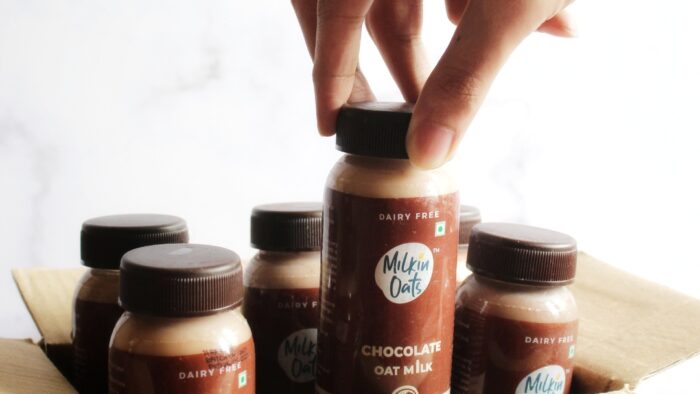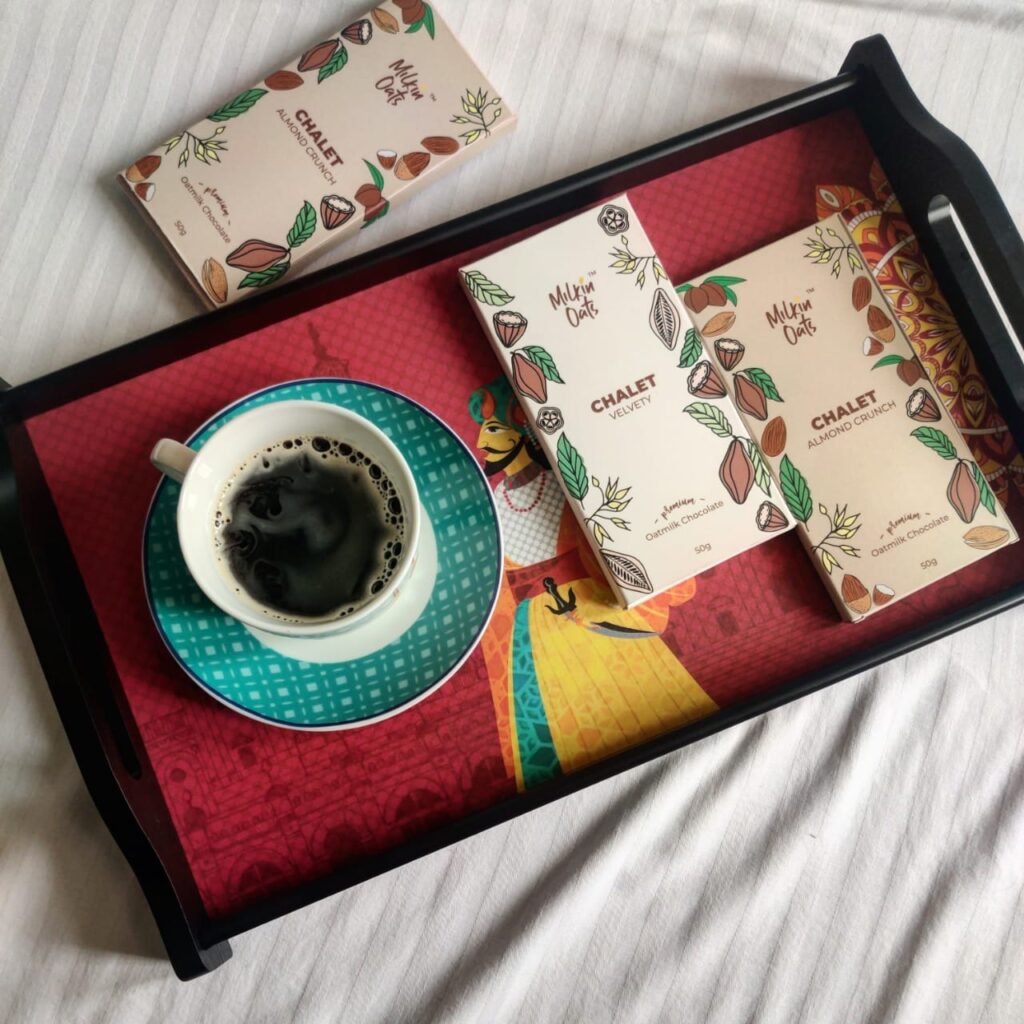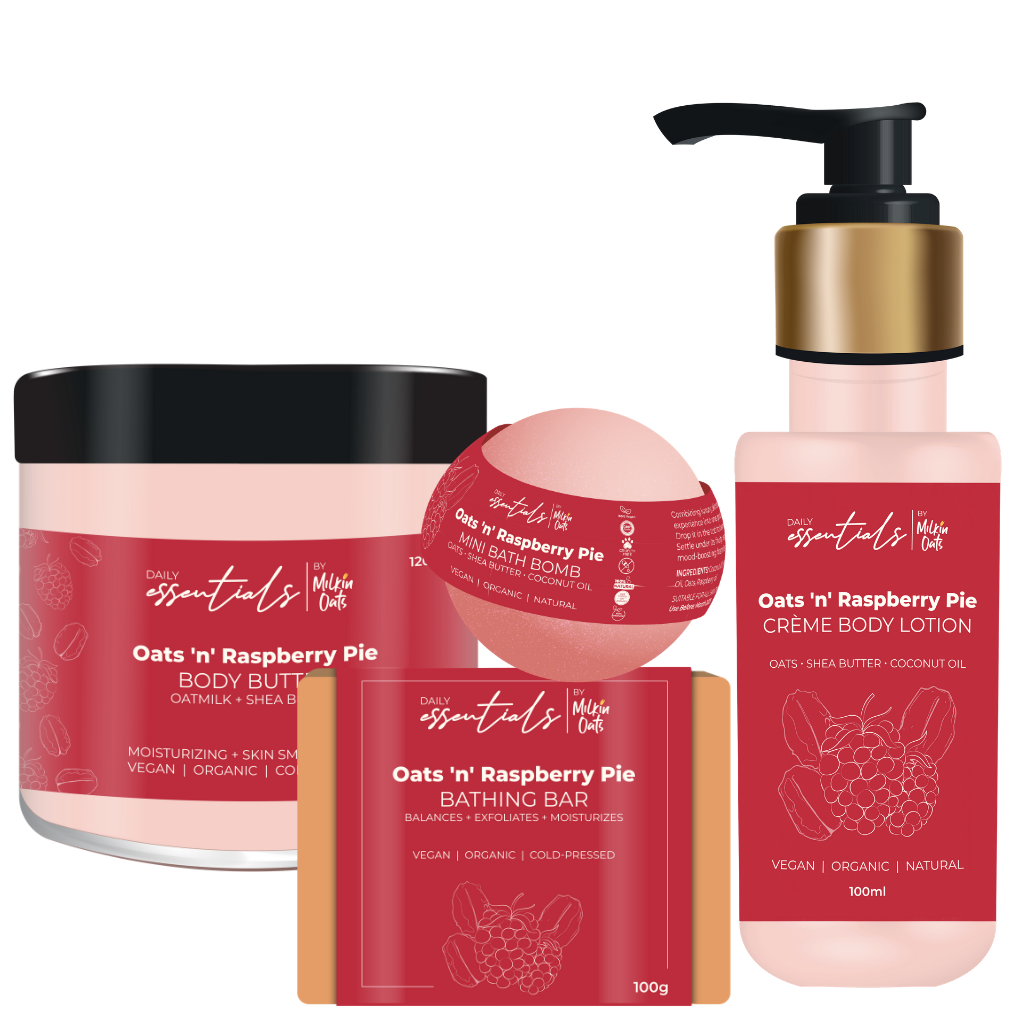“Vegan products are assumed to have a lesser nutritional value, but that is not always the case” – Ashna Goel, Founder & MD, MilkinOats
Ashna Goel was in Italy, for her fourth semester of MBA, when she was introduced to oat milk and the baker in her almost instantly fell in love with it. “Unlike other dairy alternatives like soy milk or almond milk, oat milk can be heated, boiled and foamed, and hence can be used in making teas, coffees, smoothies and Indian dishes. It is creamy, smooth and has a rich consistency, making it the perfect alternative to dairy milk. I realised that all these facts make oat milk the most suitable dairy alternative for the Indian palette and also the most sustainable among all the options.”
This motivated Ashna and her Co-Founder Vishwesh J. Nair, a lactose intolerant who was looking for dairy alternatives and also a colleague from her previous employer, to build the first 100% Made-In-India oat milk brand – MilkinOats – in October 2020. Through their product, they also started spreading awareness about veganism and sustainability.

The Founder & MD of MilkinOats, in an interview with AYUVE, told that she did know that reaching out to consumers would be a tougher task initially, given the fact that milk has been a part and parcel of Indian diet since ages. “Dairy has been a huge part of our everyday life and is used in almost all meals. So, going dairy-free might not be an easy task, at first. Also, there is lack of knowledge about dairy alternatives among Indians. To tackle this, we had to first educate people by demonstrating the usage of oat milk and also the harmful effects caused by the dairy industry to the environment and our health. This resulted in increased awareness and also created a demand for our product,” she explains.
Today, 90% of MilkinOats’ customers are vegans and lactose intolerant people, while the remaining 10% are the ones who are trying to shift to a healthier lifestyle by switching over to dairy-alternatives in their daily lives.
As regards to the ongoing debate over the nutritional values of dairy alternatives, Ashna likes to clear the air: “Vegan products are assumed to have a lesser nutritional value, but that is not always the case. Our products are made exclusively from oats and oat milk. Oats and oat milk have a lot of health benefits. They are rich in dietary fibre, omega-3 and Vitamin B12. Oat milk also replaces the saturated fats from dairy milk with unsaturated fats.”
An alumnus of SDA Bocconi Asia Center in Mumbai, she substantiates her remarks by revealing that the present Indian market for non-dairy products is estimated at around Rs 93 billion out of which, she says, approximately Rs 53 billion for oat milk alone. Though more people are realising the importance of switching to dairy-free alternatives, only a single person in a family – the lactose intolerant or the health-minded – consumes plant-based milks regularly.
“So, using 1L cartons/tetra packs might not be the best choice for such people. This is because plant-based milk is supposed to be consumed within 3-4 days of opening the carton. To overcome this problem, we launched 200 ml packs to ensure that the oat milk is consumed completely and not wasted. By avoiding such wastage, we add to the eco-friendly factor that our company strives to achieve,” says this Delhi-based entrepreneur and advocate of sustainable living.
At a time, when the world is trying out other types of plant-based milks derived from potato and cauliflower, MilkinOats wants to be a brand “whose main focus is oat milk and oats-based products”
All the raw ingredients used by MilkinOats are eco-friendly, natural and vegan. To limit its carbon-footprint, the brand uses limited amount of water in production. It is also a plastic-neutral brand; for every unit of plastic created, it recovers and removes a measured equivalent of plastic waste from the environment, thus reducing its carbon-footprint to a great extent.
At present, the brand produces three variants of oat milk – Barista’s Choice, Classic and Chocolate. Last year, it launched homegrown oat milk chocolates (Chalet Velvety, Chalet Winter Berries, Chalet Rose ‘n’ Pistachio and Chalet Almond Crunch) and oat-based personal care range under its own brand ‘Daily Essentials’ (bathing bar, mini bath bomb, body butter and crème body lotion).
“We’re the third brand after Cadbury and Lindt to have introduced an oat milk chocolate. Traditionally, women used to use oatmeal for personal care as a home-remedy in view of its moisturizing and exfoliating benefits. Hence, we introduced the oat-based personal care products to understand the consumer behavior,” she quips.
The MilkinOats’ products can be ordered on its own website and other online retail stores like Amazon, Vvegano, Vegan Dukan and One Green. They are also available in supermarkets and modern retail units like Nature’s Soul, Defence Bakery and Haryali in Delhi, Greend in Mumbai, Plantarium in Hyderabad, Earth Story in Coimbatore, The Goodness Store in Gurgaon and Earth Box in Indore.

At a time, when the world is trying out other types of plant-based milks derived from potato and cauliflower, MilkinOats wants to be a brand “whose main focus is oat milk and oats-based products. However, we are flexible to change the company’s strategy based on the changes in the market.”
When inquired about cost factor and inaccessibility of non-dairy milk and related products to most of the Indians, Ashna does agree that the prices of non-dairy products in India are high when compared to dairy products. “This is because the demand for non-dairy products isn’t as high as that of dairy products. In this day and age, the vegan market has grown a lot and this is a result of the easy accessibility of plant-based products, especially in tier-1 and metro cities. We are planing to expand into tier-2 and tier-3 cities, since the products are difficult to acquire. Until then, people can order our products online and get them delivered at their doorsteps.”
Like every other startup, the brand too had witnessed its share of challenges and struggles. “But, the customers’ positive responses have pushed us in making our products better and make them available at a competitive price. We do have plans to go global and we will do so when the time seems right. For now, we aim to create a domestic market for vegan products and make them accessible and affordable for our customers. We deeply believe in a greener, happier and fair environment where animals are viewed as living beings and their rights are valued,” she sums it up.







